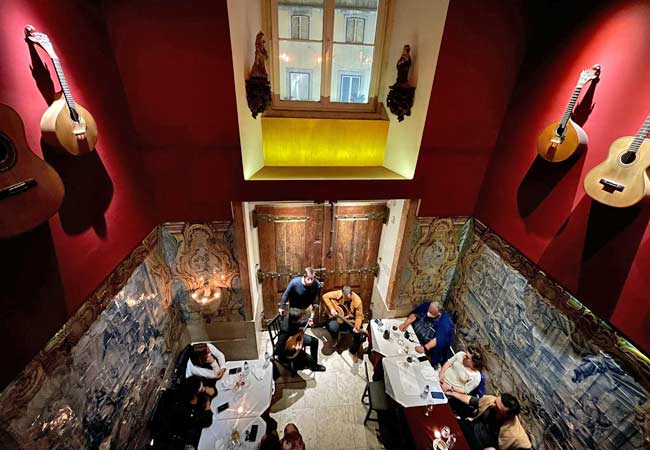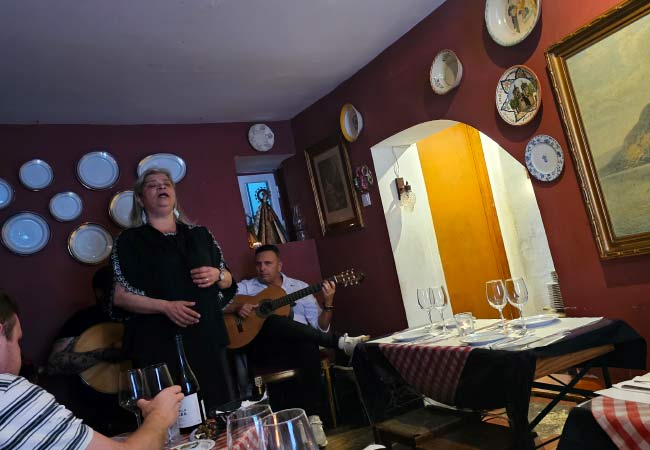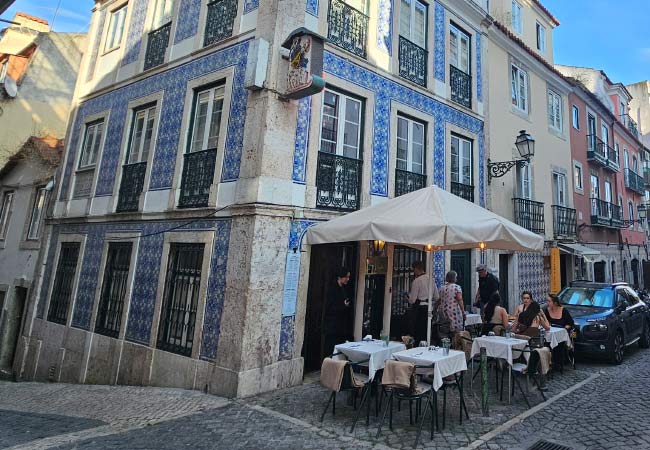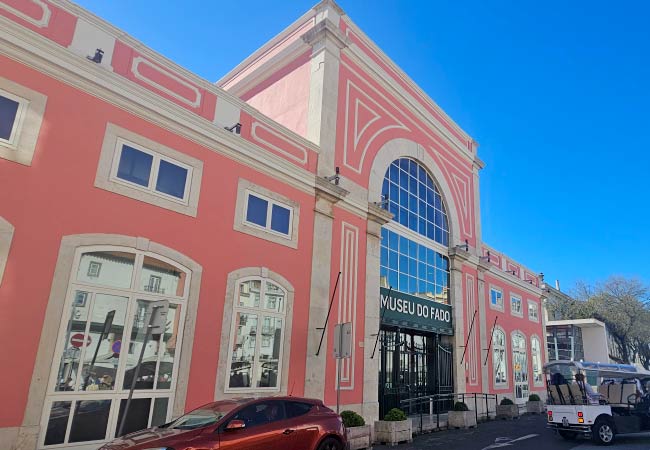LisbonLisboaPortugal.com
The best independent guide to Lisbon
LisbonLisboaPortugal.com
The best independent guide to Lisbon
Best Fado Restaurants Lisbon: Ultimate Guide to Authentic Portuguese Music Venues
Fado is the haunting music that drifts from the intimate bars and restaurants scattered throughout Lisbon's historic neighbourhoods.
This deeply emotional musical style features a solo singer accompanied by the distinctive sounds of the Portuguese guitar, creating an atmosphere that captures the very essence of Portuguese culture.
More than just entertainment, fado represents the soul of a nation, a musical tradition so significant that UNESCO recognized it as Intangible Cultural Heritage of Humanity in 2011.
The word "fado" translates to "fate" in English, but this powerful musical tradition embodies something far more complex, a profound sense of nostalgia, longing, and what the Portuguese call saudade. No visit to Lisbon feels complete without experiencing this traditional and deeply moving art form that has touched hearts for over a century.

Origins of Fado in Lisbon
Fado's melancholic melodies are believed to have emerged from the sorrow of families separated by Portugal's age of maritime exploration. The music has its deepest roots in Lisbon's oldest neighbourhoods, where the families of sailors and fishermen lived while their loved ones faced the dangers of the open sea.
While scholars debate fado's exact origins, some trace influences to Moorish chants, others to Brazilian modinhas brought back by the royal court, what's certain is that recognizable fado first emerged in Lisbon sometime after 1840. The earliest documented form was "fado do marinheiro" (sailor's fado), sung by seafarers on ship decks and in the taverns of Alfama.
Initially performed by male singers in the small taverns of Alfama, the music gradually transformed as it gained popularity beyond the waterfront community. During the mid-19th century, fado underwent a significant shift when female singers began to dominate the art form. The audience expanded from sailors and dock workers to include Lisbon's growing working class, and eventually even penetrated aristocratic salons.
The lyrics traditionally explore themes of loss, hardship, love, and the struggles of daily life, though the true essence of fado lies in its musical structure rather than its words. Regardless of the specific lyrics, authentic fado rarely strays from expressing that uniquely Portuguese feeling of saudade-a bittersweet longing that has no direct translation in English.

Where to Experience Fado
Today, visitors can experience fado in traditional "casas de fado" throughout these same historic neighbourhoods of Alfama, Mouraria and Bairro Alto, where dinner performances combine fado with Portuguese cuisine. These venues range from tourist-friendly establishments to more authentic local favourites that maintain the intimate atmosphere of historical fado houses.
For those seeking a more formal introduction to the art form, dedicated concert venues offer structured performances that focus purely on the music, typically costing around €17 for a 50-minute show and providing an excellent way to appreciate the technical skill involved in fado performance without the distraction of dining.
We have worked with GetYourGuide for the last seven years and here are some of their best Fado shows and performances:
Historic Fado Houses with Sophisticated Dining
For visitors seeking the full traditional experience, several established restaurants combine exceptional fado with fine Portuguese cuisine.
Casa de Linhares (casadelinhares.com/) stands out as one of the most atmospheric venues, housed in what was once the residence of aristocratic counts. The building's Renaissance-era architecture creates natural acoustics that enhance every performance, while diners enjoy their meal surrounded by original stone archways and exposed wooden beams.
Senhor Vinho (www.srvinho.com) offers the most upscale fado experience in the city, located in Lisbon's exclusive Lapa neighbourhood. This refined establishment attracts discerning diners who appreciate both exceptional Portuguese cuisine and polished musical performances in an elegant setting that caters to those seeking luxury alongside authentic cultural experiences.
A Severa (www.asevera.com) represents another cornerstone of Lisbon's fado scene, having operated continuously since 1955 under the same family's management. Named in honour of fado's first great female performer, the restaurant maintains its original character with hand-painted tile panels adorning the walls and antique street lamps creating an intimate ambiance.
The legendary O Faia (www.ofaia.com/) holds special significance as the venue founded by Lucília do Carmo, mother of the renowned Carlos do Carmo. Since 1947, this Bairro Alto establishment has welcomed many of fado's greatest names, and its current performers continue to uphold the high standards that made it famous. The restaurant's traditional décor and carefully curated musical programme make it an excellent choice for first-time fado experiences.

Adega Machado (www.adegamachado.pt/) claims the distinction of being Lisbon's oldest continuously operating fado house, welcoming guests since 1937. Following a comprehensive renovation, the venue now spans three floors including a main dining room, modern wine cellar for casual tastings, and an outdoor terrace, making it one of the most versatile fado establishments in Bairro Alto.
Intimate Venues for Authentic Encounters
Those seeking more intimate experiences should consider A Baiuca, a tiny establishment in Alfama with only six tables that epitomizes the neighbourhood fado house tradition. The small size requires advance reservations, but the reward is an authentically Portuguese experience that feels more like joining a family gathering than attending a tourist performance.
Mesa de Frades (www.mesadefrades.pt/) offers perhaps the most unique setting of all fado venues, occupying a converted eighteenth-century chapel. The building's religious origins add a sacred quality to the musical performances, while original ceramic tiles and chapel walls create an atmosphere unlike anywhere else in the city.
Café Luso (www.cafeluso.pt/) occupies the cellar of an eighteenth-century palace that survived Lisbon's devastating 1755 earthquake. The venue's stone vaulted ceilings create exceptional acoustics that have attracted legendary performers throughout its decades of operation, making it a favourite among serious fado enthusiasts who appreciate both historical ambiance and superior sound quality.
For those preferring a more relaxed approach, Tasca do Chico represents the best of Lisbon's tavern culture. With locations in both Bairro Alto and Alfama, these unpretentious establishments focus on fado vadio-amateur performances that capture the art form's most spontaneous spirit. Rather than professional entertainers, visitors might hear taxi drivers, shopkeepers, or grandmothers sharing songs passed down through generations.
Several venues focus primarily on musical excellence rather than dining experiences. Clube de Fado (www.clubedefado.pt), located near Lisbon's cathedral, maintains consistently high performance standards with a roster of respected professional artists.
Learning About Fado's History - the Museu do Fado
For those seeking to understand fado's cultural significance before experiencing live performances, the Museu do Fado in Alfama provides comprehensive insights into the musical heritage. Opened in 1998 and housed in a beautifully restored 19th-century former water pumping station, the museum chronicles fado's evolution from its 19th-century origins through to contemporary performers.
The museum's interactive displays, extensive archives, and collection of instruments, photographs, and personal artifacts from legendary singer create an immersive experience that deepens appreciation for the art form. The museum also features a document centre, educational workshops, and occasional live performances.
The museum is open Tuesday to Sunday from 10am to 6pm, and adult tickets cost €5. Located at Largo do Chafariz de Dentro, the museum serves as an excellent starting point for exploring Alfama's fado venues - www.museudofado.pt/

Fado Under Salazar: Censorship and Survival
One of the most significant chapters in fado's history occurred during Portugal's dictatorship under António de Oliveira Salazar (1933-1974). The regime recognized fado's power to reach the Portuguese soul and systematically co-opted it as cultural propaganda while strictly controlling its content.
Under Salazar's rule, fadistas and musicians required official licenses to perform, and all lyrics had to pass rigorous government censorship. Only certain themes were permitted: love, nostalgia, jealousy, neighborhood daily life, and bullfighting. Any lyrics addressing social problems, politics, or criticism of the regime were strictly forbidden. This censorship explains why traditional fado focuses so heavily on personal emotions rather than social commentary.
Paradoxically, this oppression may have deepened fado's emotional intensity. Unable to voice political dissent directly, performers channeled their frustrations into the music's inherent themes of longing and melancholy. The result was an art form that became even more poignant, carrying the unspoken weight of a suppressed people's feelings.
The end of the dictatorship in 1974 liberated fado from these constraints, allowing artists to explore broader themes and leading to the modern renaissance of the art form.
The Golden Age: From Taverns to Theaters
The 1930s and 1940s marked fado's golden age, when this music of the streets transformed into mainstream entertainment. Cinema, radio, and theater projected fado to a broader public, creating the first generation of professional fado artists. This period saw the birth of the "Casas de Fado"-dedicated venues where fado was performed for audiences rather than as spontaneous community expression.
This transformation brought both opportunities and challenges. Professional fadistas emerged as artists with their own styles, required to maintain good appearances and dress in the traditional black clothing. The intimate, impromptu nature of early fado gave way to more structured performances, though the emotional core remained intact.
During this era, fado gained its first international recognition, with performers like Ercília Costa-known as the "Wandering Siren of Fado"-taking Portuguese music beyond the country's borders for the first time.
The Legend of Maria Severa
The tradition of female fado singers wearing black shawls honors Maria Severa Onofriana, often considered the first great fado performer and a figure who embodies both the artistry and tragedy of the form. Born into poverty in the Mouraria district, Severa worked as a prostitute but possessed an extraordinary voice that could silence rowdy taverns and move audiences to tears.
Severa became legendary not just for her powerful performances but for her tumultuous romance with the Count of Vimioso, a relationship that scandalized 19th-century society and became the subject of countless fados. She represented the authentic, unpolished spirit of early fado, drawing from her own experiences of hardship and struggle.
Her life was tragically short, she died of tuberculosis in 1846 at just 26 years old, but her influence on fado remains profound. The black shawl worn by female fadistas today serves as a tribute to her memory, while the black clothing worn by all fado performers represents both mourning for Severa and the darkness of night when fado traditionally comes alive.
Modern Fado and the Amália Revolution
The modern era of fado began with Amália Rodrigues, who emerged in the 1950s and revolutionized the art form. Amália elevated fado by incorporating poetry from Portugal's greatest writers, Luis de Camões, Fernando Pessoa, and others, transforming simple folk verses into sophisticated artistic expressions.
Working with composer Alain Oulman, Amália modernized fado's musical arrangements while maintaining its emotional core. Her international success brought global recognition to Portuguese culture and established fado as a serious artistic medium rather than merely folk entertainment.
Following Amália's legacy, contemporary artists like Ana Moura, Carminho, Mariza, and Katia Guerreiro continue to evolve fado while respecting its traditions. These performers attract new generations of listeners and demonstrate that fado remains a living, breathing art form capable of expressing modern emotions and experiences.
Lisbon Fado vs. Coimbra Fado
Portugal has two distinct fado traditions that developed separately in different cities. Understanding their differences helps appreciate what makes Lisbon fado unique.
Coimbra fado, associated with the historic university town, is traditionally performed by male singers and has its roots in student serenades. Performers wear academic robes and sing in outdoor spaces, often as serenades beneath women's windows. This style tends to be more upbeat and romantic, focused on student life and courtship.
Lisbon fado, by contrast, is predominantly performed by women and carries deeper emotional weight. It reflects the pain and uncertainty of wives and mothers whose husbands and sons faced the perils of life at sea. This tradition is more sombre, intense, and emotionally raw than its Coimbra counterpart. The indoor, intimate setting of Lisbon's casas de fado creates a completely different atmosphere from Coimbra's outdoor serenades.
Discover more of Lisbon with our most popular guides
If you've found our content valuable, we'd welcome your support.
The digital publishing landscape has evolved significantly. As a small independent publisher, we face growing challenges. Search engines increasingly favour paid content over organic results, while AI-generated content often reproduces original work without attribution.
To support our work, please consider bookmarking this page (press Ctrl + D) for quick access. If you find an article helpful, we'd be grateful if you'd share it with friends on social media.
For specific questions, please see our Reddit community at r/LisbonPortugalTravel.
Should you notice any outdated or incorrect information, please contact us at [email protected]
Thank you for helping us continue to provide valuable content in an increasingly challenging digital environment.
A complete list of all of our Lisbon articles
If you've found our content valuable, we'd welcome your support.
The digital publishing landscape has evolved significantly. As a small independent publisher, we face growing challenges. Search engines increasingly favour paid content over organic results, while AI-generated content often reproduces original work without attribution.
To support our work, please consider bookmarking this page (press Ctrl + D) for quick access. If you find an article helpful, we'd be grateful if you'd share it with friends on social media.
For specific questions, please see our Reddit community at r/LisbonPortugalTravel.
Should you notice any outdated or incorrect information, please contact us at [email protected]
Thank you for helping us continue to provide valuable content in an increasingly challenging digital environment.



































